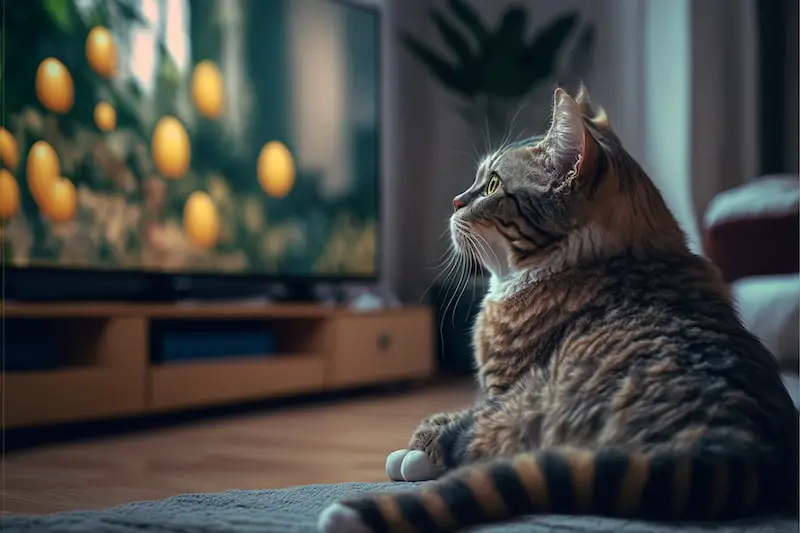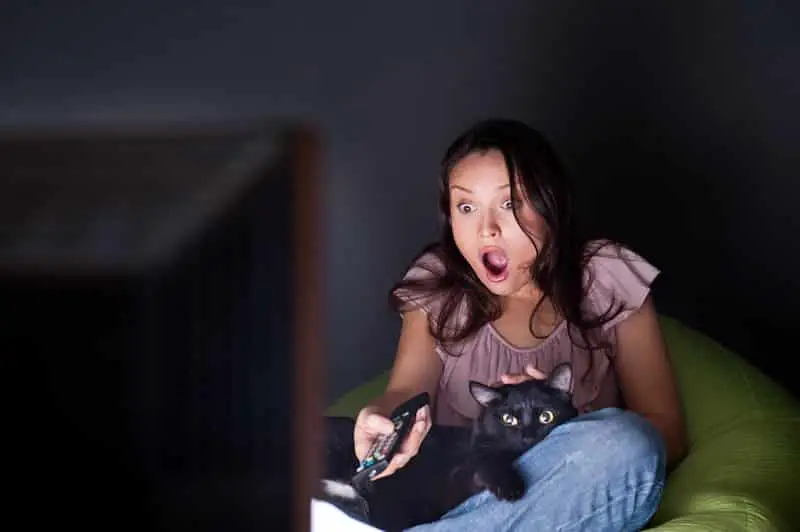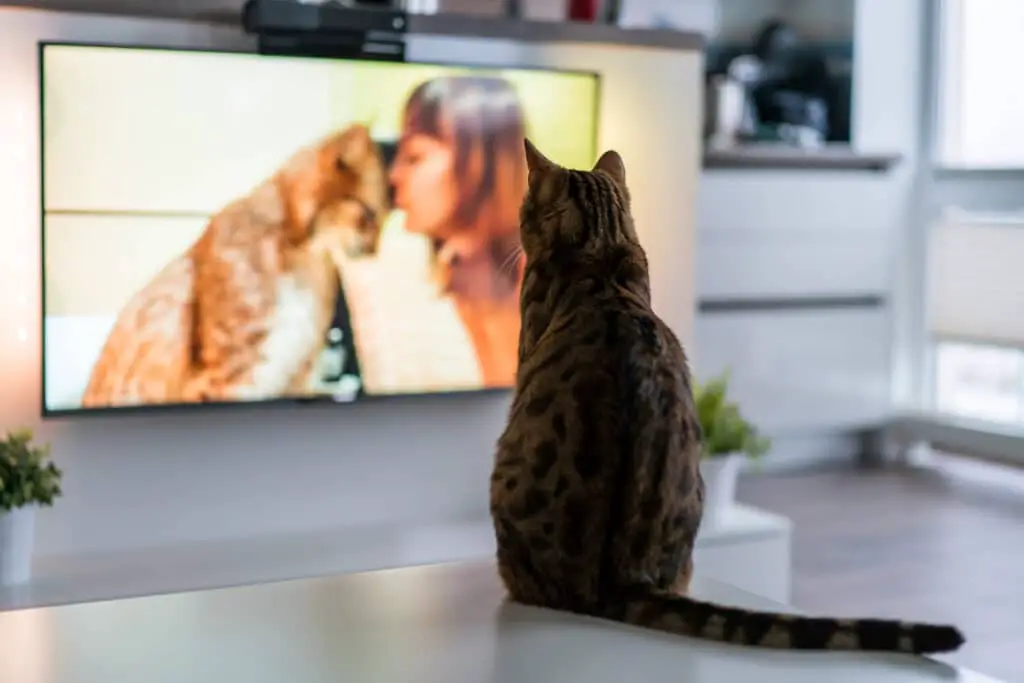Cats are known for their playful and curious nature, often engaging in various activities to keep themselves entertained. As pet owners, we love to find ways to engage and stimulate our feline friends, and one question that often comes up is whether cats watch TV.
While it may seem like a strange question, it’s not uncommon for cats to sit in front of the TV and appear to be watching it. But do they actually understand what’s happening on the screen, or are they just reacting to the movement and sounds? In this article, we will explore the topic of whether cats watch TV and delve into the science behind their behavior.
Do Cats Actually Watch TV?
The answer to the question “do cats watch TV” isn’t as surefooted as you might think. Many cats do “watch” TV, staring intently at the screen, seemingly fixated on its contents. But it might not be for the reason you think.
Also, some cats don’t look at TVs or screens at all. It’s not well understood why some cats’ interest is piqued by the TV and some don’t seem to notice it at all. Perhaps the cat see their owners as relaxed and unconcerned around the TV, and so it’s not something worth paying attention to. Or perhaps you just aren’t watching something they’re interested in.
There are several things that can be going on if your cat stares at the TV screen. In most cases, they’re not seeing it as you see it; a mechanical device displaying an entertaining storyline. It’s more likely that they interpret it differently. Here are a few ways your cat might be interpreting the TV:
Mistaking TV for A Window
Many cats will sit on a windowsill for hours and watch the world go by. TV screens are so high definition these days it’s easy for a cat to mistake the visuals there as something similar to “outside”.
When a cat “watches” TV, they might be thinking it’s all going on outside the window, and might also make them feel safe and protected from whatever is on the screen.
Curiosity
Cats are naturally inquisitive. Particularly kittens find televisions fascinating and enjoy watching movies. Kittens investigate the television with their paws and sniff the rear of the gadget to determine the source of the sounds. When they mature, most cats lose interest because over time they realize nothing on the TV can actually “get” them, but some remain curious about televisions.
Strong Hunting Drive
Cats with greater hunting instincts are more likely to enjoy TV. Not only that, but cat’s with high energy and desire to play are more likely to engage with the TV. Perhaps their threshold for excitement is lower, or perhaps they’re just desperate looking for anything to play with.
Some cats scratch the television in an attempt to catch the prey. Cats might become frustrated at their lack of success in catching whatever is on the screen.
In this case, it might be a good idea to get your cat more toys, especially ones that are battery powered and move on their own. Some cats simply need more stimulation than others.
Time With Owners

Some cats “watch” TV because they observe their owners doing it. Believe it or not, cats are actually very in-tune with their owners, watching their reactions carefully to gauge the situation.
If you have a needy cat like mine, they’ll want to not only hang out with you on the couch while you’re watching TV, but also mimic what you’re doing (i.e. looking at the screen).
So your cat might not actually be interested in the screen at all, but instead enjoying quality time with you.
Alleviate Boredom
Bored cats will try to find anything to alleviate their boredom. A bored cat is a mischievous cat.
And while pictures on the TV might not normally catch their eye, a cat that is especially bored might try to engage with the TV because there’s nothing else to do.
In this case, watching fast-moving images on TV can keep them occupied. It’s not always a bad thing for your cat to watch TV… quite the opposite. It might be a great way to keep them busy and provide excitement and stimulation.
What Do Cats See When They Watch TV?
The answer to the question of what TVs appear to cats depends on the feline’s intelligence, age, and capacity for color and depth perception. Cats typically observe the following:
Color
According to scientists, cats perceive the world as a desaturated image. Semantic Scholar states that cats need good vision to:
- Hunt
- Avoid dangerous situations
- Interact with other cats
They have fewer cones than humans do, therefore they can’t see colors and saturation as clearly. They therefore do not perceive vivid or well-defined colors. However, even if they cannot see in technicolor, they can nonetheless make out visuals that like ours.
Cats can’t see finer details either. Instead, they have a reflective layer in the retina called the tapetum. Light is reflected by the tapetum and reflected off the cones. This is what gives cats their highly developed nocturnal vision, thus it is unlikely that they can recognize the colors on a television.
Depth Perception
We can only speculate about how cats view the images on a TV because scientists don’t yet fully understand this phenomenon.
Cats see the borders and outlines of the people and animals they see on the screen rather than full images. Cats also notice flickering because their brains process information more quickly than the visuals being played. According to an American veterinarian, cats process visuals at a rate of 70–80 hertz (Hz), which means that the faster the images, the more interested cats are in what’s on the screen because it looks more real to them.
For background, humans need at least 20 frames per second on a TV screen to observe fluid, clear movement. The same experience requires roughly 100 frames per second for cats. Therefore, it’s possible that some cats are disinterested in TVs because the frames aren’t fast enough for them to make sense of it.
Newer vs. older TVs
Cats analyze visuals more quickly than humans do, thus older, typical 50 Hz TV screens look to them as a senseless flicker. Images on contemporary TVs with a 100 Hz picture frame rate are less hazy and more engaging for cats to watch.
To see how this works, consider the fact that TVs show a sequence of continuously renewing images before a new one emerges, rather than a moving video. The graphics appear seamless and fluid because our brains cannot comprehend them quickly enough. Because the visuals change more quickly on newer TVs with greater refresh rates, there is more movement.
Old TV stills appear to a cat’s eyes as a succession of flashing images. They appear much more convincing on a modern TV. Cats, meanwhile, rely more on their hearing to comprehend their environment. They probably only glance at the flitting, moving visuals but are taken in by the TV’s loudness.
Brightness
Cats have very light sensitive eyes, which is what allows them to see in the dark so well. But the flip side to that is TV screens might hurt their eyes a little, causing them distress.
Cat pupils can constrict to reduce the amount of light taken in, but the brightness can still feel overwhelming.
Do Cats Understand TV?

Cats lack the mental capacity to comprehend what a television is. Most cats can’t tell the difference between what’s on the screen and real life, however they can see colors and motions.
Cats who have never been around a TV might lash out in fear or bewilderment as the moving objects can seem scary and threatening. They can incorrectly think there is another cat in the room if they catch a glimpse of their reflections in the glass even.
The sound of the TV also confuses cats. The sounds are likely to frighten them if they can’t see where they’re coming or understand the sounds in the context of whatever is going on in the scene.
Do Cats Like the TV Left On?
You’ve probably been given the advise at one point to leave the TV on when you’re away to keep your cat from getting too lonely. But is this actually a good idea?
It all really depends on how the cat feels about the TV in the first place. If you observe your cat acting jumpy or frightening around the TV, then leaving it on when you’re not watching it might not be a good idea.
However, if your cat often looks relaxed and sleeps near the TV, it might be a familiar, comforting sound to them. Cats that have separation anxiety sometimes associated the TV with having you around if you watch it frequently.
Some cats are fascinated by “cat TV”, specific channels that show cat related thing like birds, squirrels and mice, all meant to draw a cat’s attention. If your cat loves cat TV and it doesn’t seem to cause them distress, it might be a good idea to leave it on while you’re busy or away. Just be sure to do a test run first to see how they respond; you don’t want your cat knocking over the TV in their excitement and desperation to get to a squirrel.
Why Do Cats Scratch TV Screens?
When cats start scrubbing at TVs, it becomes an issue. The majority of contemporary televisions have delicate screens that exhibit even the smallest damage. Additionally, there’s a chance that your cat might tip the TV over. TVs get scratched by cats because
- They see their reflection in the glass
- The pawing gets your attention
- They see a mouse or bird on the TV screen
- A noise from the TV triggers their hunting instincts
- They are drawn to the television’s warmth and shine.
While some cats eventually quit pawing at the TV on their own, others form a nasty habit that only grows worse with time. Here are some ways to stop your cat from scratching the TV:
- Provide a scratching post and place it next to the TV
- Play games and with toys with your cat.
- When the TV is off, cover it with a blanket or sheet.
- Prevent access to the room your TV’s in
What TV Shows Do Cats Like?
Videos with birds, mice, and fish get the best reactions from cats. Sounds are also crucial to grab a cat’s interest. The best place to look for cat-friendly TV shows is on YouTube, where you can find all sorts of amazing videos for cats. Here are a few of the most popular video types for cats:
Birds
The eight-hour-long movie “Eight Hour Bird Bonanza” shows a variety of birds eating birdseed in various outdoor settings. Cats will be mesmerized by the fast motions and chirping because the birds fly in and out of the screen so quickly, giving them the impression that they are outside in nature. Their senses are heightened and their minds are stimulated by watching bird movies. It’s sure to be a hit with your cat.
Mice
Similar to bird films, cats are sure to like watching videos of mice. A 14-minute film called “Mouse Action” features several mice munching on some delectable seeds. They even squeak, which your cat will love.
Fish
Although “Catching Fish” is an hour-long film showing fish swimming from a bird’s eye view, not all cats find fish to be as fascinating as birds and mice are.
Some cats love to hunt fish, though, and this might be a great video to try. The fish swim on and off the camera, making it even more enticing.
Cats
It’s debatable whether cats actually enjoy watching other cats on TV. It can upset some cats because they perceive another cat in their space, and cats are very territorial.
So while you may think that showing another cat on TV can make your cat feel as though they have a kitty companion, or that they’re watching a kitty protagonist in a feline movie, they’re more likely to be agitated by it.
Is Watching TV Bad for Cats?

There isn’t enough data to say definitively if TV is bad for cats. Although most veterinarians agree that there are rarely any unfavorable side effects, more research is required to be certain. Although excessive TV viewing has no known negative medical effects, it can lead to behavioral issues caused by agitation. Each cat has a different experience, and some are more impacted by television than others.
Is TV Bad for Cats’ Eyes?
The eyes of your cat may grow tired after watching TV for a long time. Although watching TV shouldn’t injure your cat’s eyes, you should occasionally turn it off to give their eyes a break and reduce the possibility of eye strain.
Is Too Much TV Bad for Cats?
As long as your cat gets plenty of activity by going outside or playing with toys and games, watching regular television is acceptable. If all your cat does is watch TV, you have a problem, and you should try to engage it in as many activities as you can in addition to turning off the television.
Is Loud TV Bad for Cats?
It’s well-known that loud TV can stress out cats. Cats rely on their keen sense of hearing to detect prey and keep themselves safe from ambushing predators. A loud TV can trigger their fight or flight response, especially in anxious cats.
Your cat may get hearing damage if they are exposed to noise levels above 95 dB for an extended length of time. The University of Michigan Health compares this to a shouting conversation for perspective. The typical TV is 75 decibels, but if it is turned up excessively loudly, it may easily reach 95.
Can Cats Become Addicted to TV?
Cats don’t typically develop TV addictions. Prey-driven cats appear to become more absorbed in what is on the screen, which can give the impression that they are addicted to it. However, if your cat meows at the TV screen nonstop, it might be having problems telling the difference between reality and television. Try diverting your cat in this situation by playing with it and utilizing its favorite toys. Be on the lookout for any obsessive or worrying habits, including:
- Increased vocalizations
- Excessive grooming
- Pawing at the TV screen
- Sitting next to the TV














